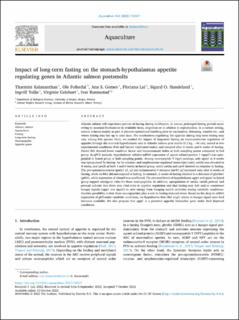| dc.description.abstract | Atlantic salmon will experience periods of fasting during its lifecycle. In nature, prolonged fasting periods occur owing to seasonal fluctuations in available feeds, migration or in relation to reproduction. In a culture setting, salmon is fasted mainly as part of planned operational handling prior to vaccination, delousing, transfer etc., and where fasting may last up to nine days. The mechanisms regulating the appetite during long-term fasting may vary among fish species. Here, we studied the impact of long-term fasting on neuro-endocrine regulation of appetite through the stomach-hypothalamic axis in Atlantic salmon post smolts (1.2 kg, ∼46 cm), reared in two experimental conditions (Fed and Fasted; triplicated tanks), and sampled after 4 weeks and 6 weeks of fasting. Fasted fish showed lower condition factor and hepatosomatic index at both sampling points compared to Fed group. In qPCR analysis, hypothalamic relative mRNA expression of agouti-related protein 1 (agrp1) was upregulated in fasted group at both sampling points. Among neuropeptide Y (npy) paralogs, only npya1 at 4 weeks was upregulated by fasting. As for cocaine- and amphetamine-regulated transcripts (cart), cart2a was elevated at 4 weeks, and cart2b at both 4 and 6 weeks in fasted group, while cart3a and cart4 showed no response to fasting. The pro-opiomelanocortin (pomc) a1, a2 and melanocortin-4 receptor (mc4r) a2 increased only after 6 weeks of fasting, while mc4rb1 did not respond to fasting. In stomach, 6 weeks of fasting resulted in a decrease of ghrelin1 (ghrl1), while expression of mboat4 was unaffected. The elevated levels of hypothalamic agrp1 and npya1 in fasted group support orexigenic roles for these neuropeptides. In addition, upregulation of cart2a, cart2b, pomca1 and pomca2 indicate that these play vital roles in appetite regulation and that fasting may halt and/or counteract hunger signals (agrp1 and npya1) to save energy from foraging search activities during catabolic conditions. Another possibility is that these neuropeptides play a role in fasting-induced stress. Based on the drop in mRNA expression of ghrl under catabolic conditions, we hypothesize that Ghrl might return as hunger signal once feed becomes available. We also propose that agrp1 is a potential appetite biomarker gene under feed deprived conditions. | en_US |
